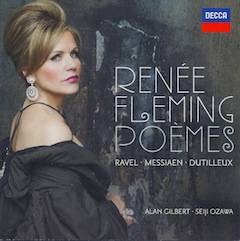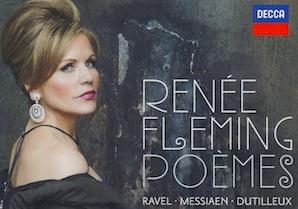
You have to hand it to Renée Fleming. At a time in life when many a soprano would be content to rest on her laurels, she continues to take risks and explore new territory. Attesting to her spirit of adventure, her new recording of music by Ravel, Messiaen, and Dutilleux includes the 2009 live premiere recording of a work that Dutilleux composed specifically for her voice, Le Temps l’horloge (Time and the Clock).
Many will be drawn to Fleming’s Poèmes CD for its most familiar offering, Ravel’s gorgeous Shéhérazade. Beautifully supported by L’Orchestre Philharmonique de Radio France, whose guest conductor, Alan Gilbert, provides accompaniment as languorous and misty as her singing, Fleming is in wonderful voice. The 2011 studio performance may be considerably slower than Régine Crespin’s benchmark outing with Ernest Ansermet, yet it shows Fleming equally adept at sensual mystery. Her tone is quite covered — Fleming rarely lets the lid off her sound, which works to her advantage in this repertoire — but her smoky, nightclub-ish low range works well in music whose seething sensuality is itself ambiguous. Although her enunciation is far from ideal, and her distinctly nonnasal French far from idiomatic, she puts everything she’s got into this music, to marvelous effect.
Listen To The Music
"Épouvante" from Messiaen's Poèmes pour Mi"Le temps l'horloge" from the eponymous work by Dutilleux


Note, in the opening song “Asie” (Asia), the horror that Fleming brings to her description of cadis and viziers who dispense life and death at will. Equally distinctive is the beautiful way she fades out at the end. Add in Gilbert’s pastel palette, his viscerally sensual swells, and percussion far more emphatic than Ansermet’s, and you have a recording that merits accolades.
Hearing a cassette of a live recording of Shéhérazade, sung by Elly Ameling with the Rochester Philharmonic, convinced a young Fleming to focus on classical music rather than jazz. Messiaen’s early Poèmes pour Mi, by contrast, came to her decades later, when Gilbert suggested she sing the collection of nine songs for his 2009 inaugural concert as music director of the New York Philharmonic.
She puts everything she’s got into this music, to marvelous effect. Messiaen’s music and texts, a curious and sensually compelling love declaration to his first wife (whom he nicknamed “Mi”), meld Catholic devotion with transcendent sensuality. German soprano Anne Schwanewilms, who, like Fleming, specializes in the music of Richard Strauss, offers better diction and accent, and a clearer, more appealingly open sound on her recent Messiaen disc for Naxos, but Fleming’s extra gutsiness, seductive sensuality, and infinitely superior orchestral accompaniment make her version preferable. Don’t miss how she ends the last song with the exclamation “La Joie est revenue” (Joy has returned). (For a recording of Messiaen’s original version for soprano and piano, try Susanna Phillips’ new French recital on Bridge.)
A chance meeting with Dutilleux led to his offer to premiere Le Temps l’horloge with Seiji Ozawa and L’Orchestre National de France on May 7, 2009. Here paired with a studio recording of the composer’s early Deux Sonnets de Jean Cassou, which Dutilleux transcribed for Fleming so he could hear his music in her voice, the new work shows the soprano at her versatile best. At one point speaking her lines, and leaping to the stratosphere at the very end, she gives us a definitive performance on what I believe to be her finest recording in many a year.

